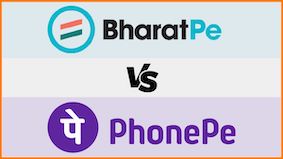The Bombay High Court on Oct 22, 2021, has settled the long-running tussle between PhonePe and BharatPe over the usage of the word ‘Pe’.
After the launch of BharatPe’s Buy Now Pay Later service – PostPe, the PhonePe moved to Bombay High Court for the grant of injunction against the usage of the alleged mark on the ground that the mark PostPe has the word “Pe” which is a distinctive and memorable part in their trademark and hence the defendant cannot use it. It then claimed that the use of the word “Pe” would amount to infringement.
The Bombay High Court while dealing with the case noted that PhonePe does not have the registration of the word “Pe” separately and therefore the court debunked the claim made by PhonePe by stating that PhonePe cannot claim exclusivity over the element of its mark. The rule is that the mark must be taken as a whole and hence the usage of ‘Pe’ cannot be judged independently. The terms PhonePe and PostPe must be compared as a whole and then the similarities such as visual, structural and phonetic should be seen.

The Court also stated that “If the plaintiff (PhonePe) has no exclusivity over the mark ‘Pe’, I do not see how it can claim this exclusivity indirectly in paragraph after paragraph of the Plaint. It is one thing to say that the defendant’s (BharatPe) mark, taken as a whole, is close to the PostPe, also taken as a whole. It is quite another to take an element of each, which cannot possibly be the subject of exclusivity, and then claim injunctions on that basis”.
Owing to the judgement made by Hon’ble Bombay High Court, PhonePe withdrew the injunction suit and has issued a statement that it will file a fresh suit in consonance with the observations made by the court.
This is not the first legal tussle between PhonePe and BharatPe. PhonePe had earlier also filed a suit of trademark infringement and for the grant of permanent injunction against BharatPe in Delhi High Court in the year 2019 claiming the exclusivity on ‘Pe’ suffix. Justice C. Hari Shankar of Delhi High Court while delivering the judgement of this case stated that “the word ‘Pe’ in PhonePe was nothing but a misspelling of a descriptive word “Pay”, and “no exclusivity can be claimed, over a descriptive mark, or a descriptive part of the mark, even by misspelling it”.
The Court also held that “if a descriptive mark has acquired distinctiveness, i.e. it has acquired a secondary meaning in the mind of the consumer, to the goods or services provided by the proprietor thereof, then in that case exclusivity can be claimed for that mark but it has to be proved by the proprietor of the mark that the said mark has entirely displaced the primary descriptive meaning of the word”. However this could not be held in the case of the word “Pe” as it connotes the expression “Pay” no secondary meaning has yet been attached to it, it still simply means to pay. Therefore no claim of exclusivity over it can be sustained.
The same observation can be seen in ITC Limited v Nestle India Limited case wherein ITC filed a suit for passing off against Nestle for the use of the term “Magical Masala” on its product. ITC claimed that the term “Magical Masala” used by Nestle is similar to the term “Magic Masala” that it has been using since 2010 for its noodles. The court, in this case, observed that the term “Magic Masala” has become common to the trade and therefore could not be registered as a trademark and the exclusivity for it can’t be claimed under usual circumstances but if the mark has acquired distinctiveness, i.e., a secondary meaning with regards to the manufacturer’s goods, it could be identified as a valid trademark and exclusivity could be claimed. However, no such secondary meaning with respect to the term “Magic Masala” was acquired by the brand ITC, therefore the plea of ITC was dismissed.
Therefore, this can be inferred from the Bombay High Court judgement that in order to serve as a trademark, a mark must be taken as a whole and must not be divided into individual elements. Earlier, Delhi High Court in their order had stated that the term Pe has not acquired distinctiveness.
For more information, please email us at [email protected]

